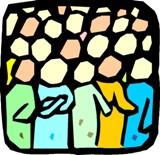Home | About Us | Directions | Bulletins | Sermons & Audio | Cross Of Christ Studies | Classes | Student and Parent Resource Page | Dangers Facing the "Non-Traditional"
Click Here for the Latest Edition of the Auburn Beacon

The Beacon is sent weekly
Hear Tim Stevens in a Series of Lectures and Congregational Singing
Click Here for Audio and PowerPoint Files
Planning to Visit Us?
What
to Expect
Current Class
Information
Thoughts To Ponder
Man is a
gregarious
animal, and much more so in his mind than in his body. He may like to go
alone for a walk, but he hates to stand alone in his opinions.
You will need
the following viewers
to view many of the
files on this site.
![]()
Click here to
download
Adobe Acrobat Reader
![]()
Click here to
download
Microsoft PowerPoint Viewer
University church of Christ
Assembly Times
Sunday
Bible Classes (9:30)
AM Worship (10:20)
PM Worship (6:00 pm)
Wednesday
Bible
Classes
(7:00 PM)
Location
449 North Gay Street
Auburn, AL 36830
Click Here for Specific
Directions
Evangelist
Larry Rouse
1147 Terrace Acres Drive
Auburn, AL 36830
Cell:
(334) 734-2133
Home:
(334) 209-9165
Contact Us
University
church
of Christ
449 North Gay Street
Auburn, AL 36830
Or
directly e-mail us at:
LarryRouse@aubeacon.com
A Study of
the
Local Church
Wed. Night Adult Bible Class
by
Larry Rouse
Download the outlines:
Lesson1 - Attitudes Towards Open Study and Resolving
Differences
Lesson 2 - The Need to Find Bible Authority
Lesson 3 - The Local Church and the Individual Christian
Lesson
4 - The Work of a Local Church
Lesson 5 -
The Organization of a Local Church
Lesson 6 -
The Fellowship of a Christian
Click Here for Audio and Other Files
What Saith the Authorities?
by Hiram Hutto
Once while two Christians were discussing a Bible subject, one of them asked, "What do the authorities say about it?" No doubt he had in mind such things as lexicons, Bible dictionaries, historic, and geographic. Yet I feel that sometimes (though not with the one who raised the question) there is the all too prevalent attitude to depend on what men may say about a certain Bible subject or passage. It may be a lexicon; it may be a dictionary, or it even may be a preacher, but such is surely to be deplored. Paul said that we ought "not to think of men above that which is written." (1 Cor. 4:6).
None of the foregoing is meant to disparage the use of tools in Bible study. I am persuaded that it would be good if more members of the church would invest a little more money in such aids as dictionaries, lexicons, and the like. What I am trying to say, however, is that such should be kept in their proper place; namely, that of an "aid" or a "tool". A Bible dictionary can be a good thing. Nevertheless it is not the Bible; it is not the word of God; it is a dictionary. It ought to be merely an aid that does just that aid; aid in understanding the Bible, not replace it.
And the same goes for commentaries. I am not opposed to the proper use of good commentaries. I use them frequently. I fear, though, that many times, the joke "A good commentary is one that ages with what I already believe" is far more than a joke. It's a fact! Just because Johnson's Notes may say a thing does not mean that it is so. Just because Adam Clarke may be quoted does not mean that such is the truth. More seldom than somewhat one meets such expressions as: "This passage means so and so." Proof? "See Albert Barnes, page 22!" or "What happened then was thus and thus." How do you know? "See MacKnight, page 38!" Such does not prove anything other than that is what Albert Barnes or somebody thinks. And, frankly, that is not the word of God.
What is an authority? What is a scholar? Well, oftentimes it depends upon whom you ask. Webster says that a scholar is "one who has engaged in advanced study and acquired knowledge in some special field", and I suppose that is the usual way in which the word is used. Nonetheless, we need to remember a few things:
1. Scholars are not divine; they are human beings. Their opinions may be weighty but they are not inspired. They may be skilled in some special field but they do not know everything in that field. They may have acquired some knowledge but they have not acquired all knowledge. Just because a man may know a few things in one field does not mean that he is skilled in another field. Scholars may be learned but they are not infallible.
2. Sometimes scholars, being human beings, are prejudiced. A fellow doesn't have to read very many of them to discover this. At times scholars allow previous practice and previously held positions of their own to influence their thinking. It's not a bad idea to know something about a given scholar's background.
3. Oftentimes scholars disagree. If you look long enough you can find some scholar or authority to substantiate nearly any position imaginable. This might be a good place to point out that the oft heard expression "all scholars agree..." is a figment of an imagination; it just ain't so unless you have a pretty limited definition of the word "scholar". Which reminds me of the debate I heard between two college students from England and two from the University of Florida. One of the Florida students chided the English for not quoting any authorities to substantiate their position. To which one of the English debaters replied, "You can quote authorities on any side of any question. But if you want an authority, here is what one noted authority has written...." Then he concluded, "If you want to know who that authority is and where he wrote such, I made the statement, I wrote it, and that's pretty good authority, at least to me." Well, since scholars disagree it is a good idea to consult several; don't take one man's word.
4. Let us never get to the point that we feel that because a scholar or even many scholars may say a thing then that must be the way it is. Their thoughts may be valuable. but they are not absolute. Before such we may bend, but we must not bow. Remember, we are to "prove all things" (1 Thess. 5:21). We are to "try the spirits", so 1 John 4:1 says. The place to do the proving and the trying is in the word of God. Again let it be noted that we may respect men, and we may study them, but we must not "think of men above that which is written" (1 Cor. 4:6). "If any man speak, let him speak as the oracles of God" (1 Pet. 4:11). When we say, "What saith the authorities?" let us mean "what saith the scriptures".
Other Articles by Hiram Hutto
Differences in Bible Miracles and Modern Miracles
![]() Would you like
others to read this article?
Would you like
others to read this article?










